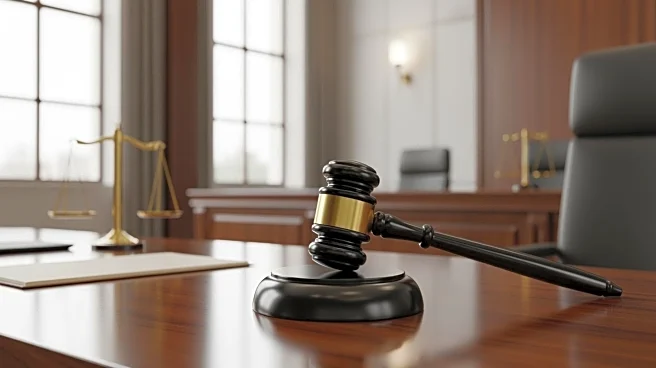What's Happening?
A law firm has been ordered to pay wasted costs after it cited two fictitious cases generated by artificial intelligence (AI) in a legal application. The firm, representing a former student in a claim against Birmingham City University, submitted an application on July
10, 2025, which included these fictitious cases. The university's solicitors, JG Poole & Co, were unable to locate the cases and requested copies. The law firm subsequently withdrew and resubmitted the application without the fictitious cases, claiming the initial submission was an error. The application was struck out with indemnity costs on July 30, 2025. The claimant's solicitor admitted that the cases were AI-generated and that a member of the administrative team had submitted the application without the solicitor's knowledge, using a built-in AI research feature of legal software. His Honour Judge Charman ruled that the solicitor's actions were improper, unreasonable, and negligent, meeting the threshold for a wasted costs order.
Why It's Important?
This incident highlights the growing challenges and risks associated with the use of AI in legal practices. The reliance on AI-generated content without proper verification can lead to significant legal and financial repercussions, as demonstrated by the wasted costs order. It underscores the necessity for legal professionals to exercise due diligence and maintain oversight when utilizing AI tools. The case also serves as a cautionary tale about the potential for AI to disrupt the administration of justice if not properly managed. Legal firms and professionals may need to reassess their use of AI technologies to prevent similar occurrences, ensuring that AI serves as a tool for efficiency rather than a source of error.
What's Next?
The legal community may see increased scrutiny and regulation regarding the use of AI in legal proceedings. Firms might implement stricter protocols for verifying AI-generated content to avoid similar pitfalls. Additionally, there could be a push for more comprehensive training for legal professionals on the ethical and practical implications of AI use. The case may also prompt discussions on the development of industry standards for AI applications in law, aiming to balance innovation with accountability.
Beyond the Headlines
The case raises ethical questions about the delegation of legal responsibilities to AI and the potential erosion of accountability in legal practices. It also highlights the need for a cultural shift within the legal industry to adapt to technological advancements while safeguarding the integrity of legal processes. Long-term, this incident could influence how AI is integrated into other professional fields, emphasizing the importance of human oversight in AI applications.

















